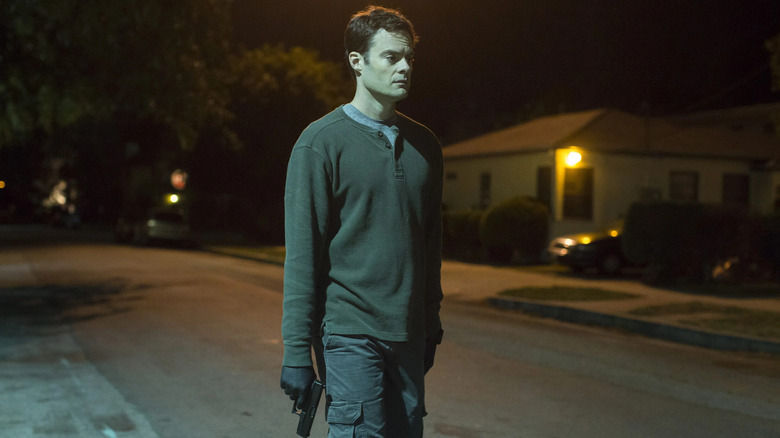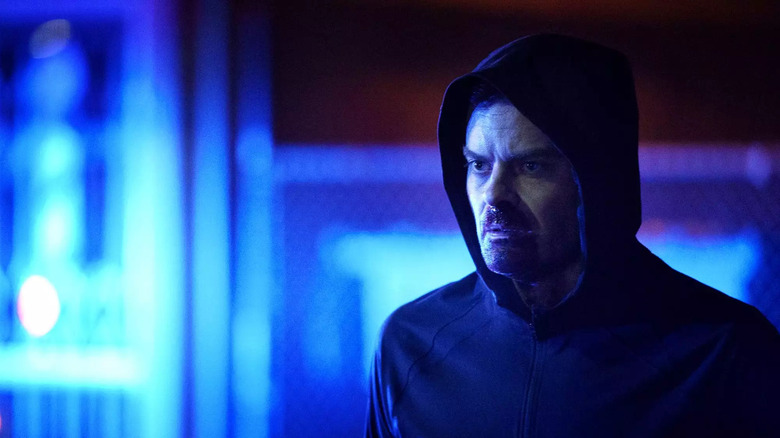Bill Hader Thinks Barry Might Lose Some Fans In Season 3
"Barry" returns with its third season this Sunday and although the reviews are promising, it doesn't seem like good times are in store for any of the show's characters. Bill Hader's Barry in particular will start the season in a particularly dark place, having just gone on a murder rampage that killed 25 people. And that's before he has to deal with the fact that Cousineau (Henry Winkler) knows about the murder of his girlfriend.
In a recent interview, Collider asked Hader about this, and if we're even supposed to find Barry "lovable." Hader was forthright with his answer:
"I mean, I never found him lovable. It's interesting how people found him lovable. I think he's a highly, highly complicated guy, who's not that bright and pretty violent. He is trying for something. He's trying to understand himself, but maybe people sometimes see themselves in these things. But when we're writing it, it's always, 'What's the interesting, honest, truthful thing about the guy.'"
Hader's right in that it is interesting how much viewers have latched onto Barry, even as we watched him kill an innocent civilian in Afghanistan in season 2's "What?!" and tried to murder a pre-teen girl in the next episode, "ronny/lily." As irredeemable as the man's actions are, his loneliness and his increasingly futile desire to start a new life for himself still manage to make us root for him. At the very least, he's always compelling. Hader compares his experience with the character to his experience watching Martin Scorsese's "Goodfellas":
"'Goodfellas,' I'm along for the ride. 'Wow. What a cool group of guys.' And then Spider gets killed or the scene where he grabs a gun from Lorraine Bracco's and shoves it in her face. And that seems awful. And you go, 'Oh right. These are violent, awful people.' So, I see Barry that way."
'I don't know if he will hold the audience's loyalty this season'
It seems like "Barry" is planning to take its main character down a similar path that other leads from anti-hero shows have trod before. The first seasons of these kind of shows often play around with the idea that maybe the protagonist's actions aren't as terrible as they seem on the surface. Walt from "Breaking Bad" may be cooking and selling meth, but he claims it's only to provide a good life for his family. Barry may be a killer, but he's only killing bad people who did something to deserve it.
But just as "Breaking Bad" gradually makes it clear that Walt's motivations aren't quite as honorable as wanting to provide for his family, "Barry" makes it clear it's main character's willingness to kill is not just confined to people who deserve it. Season 1 ends with him killing detective Janice Moss (Paula Newsome) out of self-preservation, even though he considers her to be a good person. Season 2 shows Barry's attempts to find redemption after breaking his own moral code, only to abandon that code entirely in the bloodbath of a finale.
"I don't know if he will hold the audience's loyalty this season," Hader told The Hollywood Reporter, but he doesn't think that's necessarily a bad thing, explaining, "With movies where they were trying to make sure that you liked the main character, I would always feel a little cheated."
He's clearly not alone on this, as the ongoing popularity of his show (and the popularity of anti-hero television in general) can attest. Some of the best TV shows of all time are centered around characters who do bad things for bad reasons. "Barry" is joining their ranks because the writers understand what the creators of "The Sopranos" and "Mad Men" understood: when it comes to your main character, likeability is overrated. Compelling is what matters most.

